1. Overview
Kirill (secular name: Vladimir Mikhailovich Gundyayev) is a prominent Russian Orthodox bishop who has served as the Patriarch of Moscow and All Rus' and the Primate of the Russian Orthodox Church since February 1, 2009. Born in Leningrad (now Saint Petersburg) in 1946, Kirill's ecclesiastical career began early, with his tonsure as Kirill and subsequent ordinations as hierodeacon and hieromonk in 1969. He rose through the church hierarchy, serving as a representative to the World Council of Churches (WCC), rector of the Leningrad Theological Academy, and notably as Metropolitan of Smolensk and Kaliningrad while leading the Russian Orthodox Church's Department for External Church Relations.
His tenure as Patriarch has been marked by significant administrative reforms within the Church and a close alignment with the Russian state, particularly under President Vladimir Putin. Kirill's relationship with Putin, whom he has described as bringing about a "miracle of God" for Russia, is central to his leadership, often framed by the concept of "symphonia" between church and state. However, his patriarchate has also been mired in numerous controversies and criticisms, including allegations of past affiliation with the KGB, financial scandals involving luxury goods and alleged profiteering, and strong endorsements of Russian political figures and military actions. His staunch support for the 2022 Russian invasion of Ukraine, which he has characterized as a "Holy War" against "forces of evil" and a struggle against "gay pride parades," has drawn widespread international condemnation and led to sanctions from various countries, raising serious questions about his stance on human rights and democratic values within the global Christian community.
2. Early Life and Education
Kirill's early life and educational journey laid the foundation for his long and influential career within the Russian Orthodox Church, shaped by his family's deep ecclesiastical roots and his rigorous theological training.
2.1. Family Background
Kirill was born Vladimir Mikhailovich Gundyayev in Leningrad (present-day Saint Petersburg) on November 20, 1946. His father, Reverend Mikhail Gundyayev, was a Russian Orthodox priest who passed away in 1974. His mother, Raisa Gundyayeva, worked as a German language teacher and died in 1984. Kirill has an elder brother, Archpriest Nikolay Gundyayev, who is a professor at the Leningrad Theological Academy and currently serves as the rector of the Holy Transfiguration Cathedral in St. Petersburg. His paternal grandfather, Reverend Vasily Gundyayev, was a prominent figure who faced severe persecution for his religious activities. He was imprisoned as a Solovki prisoner and exiled during the 1920s, 1930s, and 1940s due to his unwavering commitment to the Church and his active opposition to Renovationism, a movement seen by traditionalists as an attempt to modernize and secularize the Church under Soviet influence. This family history of devotion and struggle against state suppression significantly influenced Kirill's perspective and dedication to the Church.
2.2. Education and Early Career
After completing the eighth grade (Year 9) of secondary school, Vladimir Gundyayev began working for the Leningrad Geological Expedition from 1962 to 1965 as a cartographer. During this period, he balanced his work responsibilities with his ongoing studies at secondary school. Upon graduating from school, he pursued higher education in theology, enrolling in the Leningrad Seminary and subsequently the Leningrad Theological Academy. He graduated from the Academy with honors in 1970, earning a degree in theology. His academic achievements were later supplemented by honorary doctorates, including an honorary doctorate of theology from the Budapest Theological Academy in Hungary in 1987.
From 1970 to 1971, Father Kirill served as a teacher of Dogmatic Theology and as the rector's assistant for student affairs at the Leningrad Theological Schools. Concurrently, he also worked as the personal secretary to Metropolitan Nicodemus (Rotov) and as a supervising instructor for first-grade seminarians, showcasing his early leadership and administrative capabilities within the Church's educational system.
2.3. Ordination
Vladimir Gundyayev's full immersion into church service began on April 3, 1969, when Metropolitan Nicodemus (Rotov) of Leningrad and Novgorod tonsured him with the monastic name of Kirill, named after Cyril the Philosopher. Just four days later, on April 7, he was ordained as a hierodeacon, a monastic deacon. His ordination to the priesthood followed shortly thereafter, on June 1, when he was ordained as a hieromonk, a monastic priest. These early ordinations marked the official commencement of his dedicated ecclesiastical career.
3. Ecclesiastical Career
Kirill's ecclesiastical career before his enthronement as Patriarch of Moscow was marked by rapid ascent through the ranks, significant international engagements, and a growing influence within the Russian Orthodox Church.
3.1. Archimandrite and Episcopal Consecration
On September 12, 1971, Kirill was elevated to the rank of archimandrite, an honorific title for hieromonks. This elevation coincided with his posting as a representative of the Russian Orthodox Church to the World Council of Churches (WCC) in Geneva, Switzerland, a role he held until 1974. His involvement with the WCC deepened over the years, as he became a member of its central and executive committees starting in December 1975, actively participating in the ecumenical activities of the Russian Orthodox Church.
On December 26, 1974, he was appointed Rector of the Leningrad Theological Academy and Seminary, a position he held until December 26, 1984. His episcopal consecration took place on March 14, 1976, when Archimandrite Kirill was consecrated as Bishop of Vyborg, serving as a Vicar of the Leningrad diocese. He was elevated to the rank of Archbishop on September 2, 1977. His diocesan responsibilities expanded, first as Archbishop of Smolensk and Vyazma from December 26, 1984, then as administrator of parishes in the Kaliningrad Region from 1986, and finally as Archbishop of Smolensk and Kaliningrad from 1988. On November 13, 1989, he was appointed Chairman of the Department for External Church Relations and became a permanent member of the Holy Synod of the Russian Orthodox Church. His stature continued to grow, culminating in his elevation to the rank of Metropolitan on February 25, 1991.
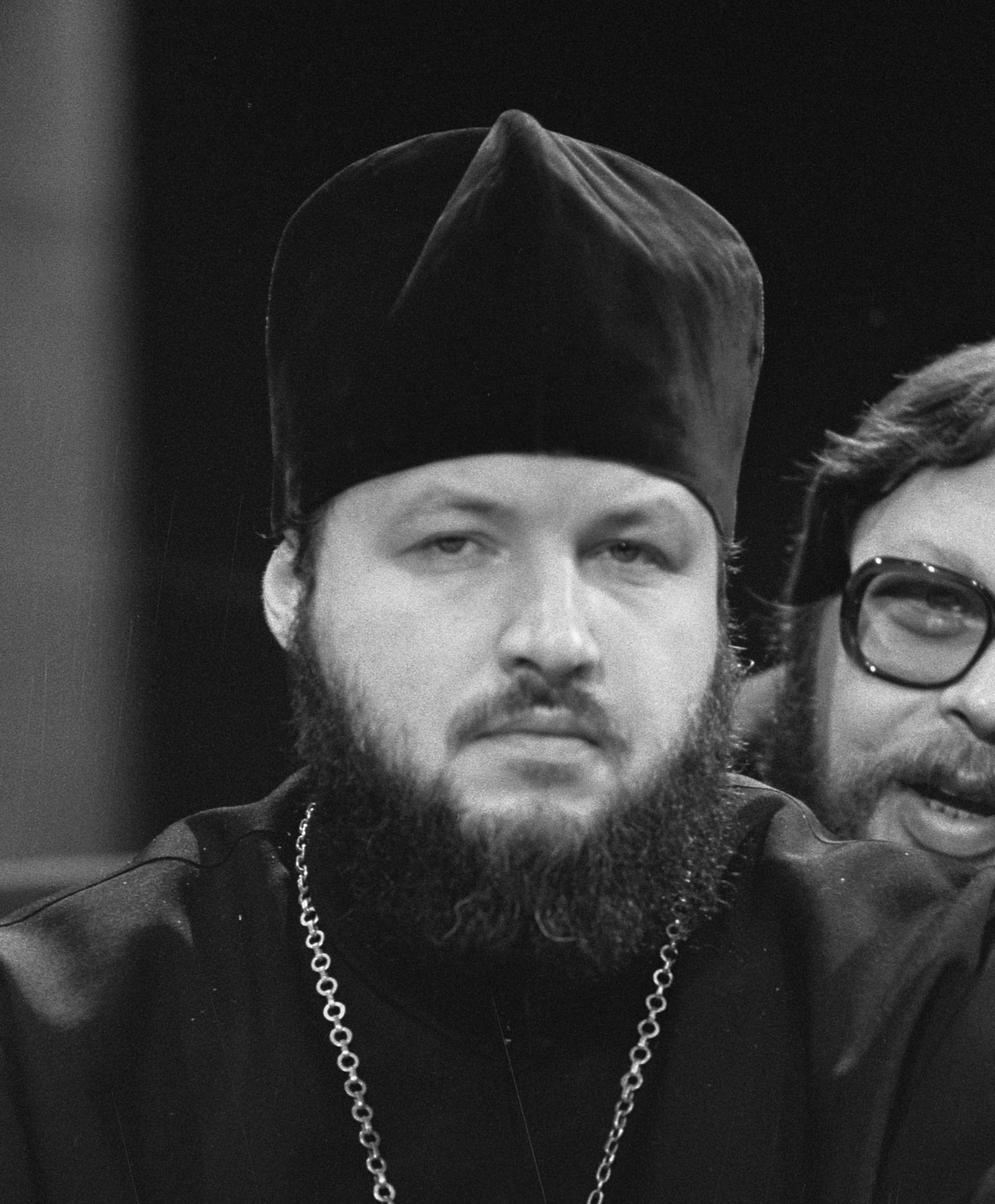
3.2. Diocesan Administration and Church Reform Involvement
Throughout his episcopal ministry, Kirill undertook extensive responsibilities in managing various dioceses and participated in numerous commissions for church unity and social issues. From 1975 to 1982, he served as the Chairman of the Leningrad Diocesan Council. He was a member of the Holy Synod commission for Christian unity from 1976 to 1984. His administrative roles extended internationally, as he served as administrator of the Patriarchal Parishes in Finland from 1978 to 1984, and later as administrator of the Hungarian Orthodox deanery from 1989 to 1996. He also held temporary administrative positions for the diocese of the Hague and Netherlands (1990-1991) and the diocese of Korsun (1990-1993).
Kirill was actively involved in significant church events and social initiatives. He was a member of the preparatory commission for the Millennium of the Baptism of Russia from 1978 to 1988, contributing to the monumental celebrations that marked a thousand years of Christianity in Russia. In 1990, he was a member of both the preparatory commission for the Local Council of the Russian Orthodox Church and the commission tasked with assisting in overcoming the consequences of the Chernobyl accident, demonstrating his engagement with both internal church governance and pressing social concerns. From 1990 to 1993, he chaired the Holy Synod commission for reviving religion and morality, playing a crucial role in shaping the Church's response to the post-Soviet spiritual landscape.
3.3. External Church Relations and Media Activities
Kirill's leadership in the Department for External Church Relations was a defining aspect of his pre-patriarchal career, allowing him to establish significant international connections and a public profile. His appointment as Chairman of the DECR in 1989 positioned him as the primary diplomat of the Russian Orthodox Church, overseeing its interactions with other Christian denominations, foreign governments, and international organizations.
A notable international meeting occurred on October 20, 2008, during a tour of Latin America, when Metropolitan Kirill met with Fidel Castro, the First Secretary of the Communist Party of Cuba. Castro publicly praised Kirill as an ally in the fight against "American imperialism". In recognition of their decision to build the first Russian Orthodox Church in Havana to serve Russian expatriates, Kirill awarded Fidel and Raúl Castro the Order of St. Daniel of Moscow on behalf of then-Patriarch Alexy II.
Since 1994, Kirill has hosted a popular weekly Orthodox television program titled "Слово пастыряSlovo pastyryaRussian" (The Word of the Shepherd) on ORT/Channel One. This program significantly raised his public visibility and allowed him to communicate the Church's message directly to a broad audience, establishing him as a prominent media figure even before becoming Patriarch.
4. Patriarchate of Moscow
Since his election in 2009, Kirill's patriarchate has been marked by significant administrative changes, complex ecumenical efforts, and a strong, controversial relationship with the Russian state.
4.1. Election and Enthronement
On December 6, 2008, the day after the death of Patriarch Alexy II, the Holy Synod of the Russian Orthodox Church elected Kirill as locum tenens of the Patriarchal throne, entrusting him with the temporary leadership of the Church. During the funeral service for Alexy II on December 9 in the Christ the Saviour Cathedral, which was broadcast live on Russian state TV, Kirill was observed to have fainted at one point.
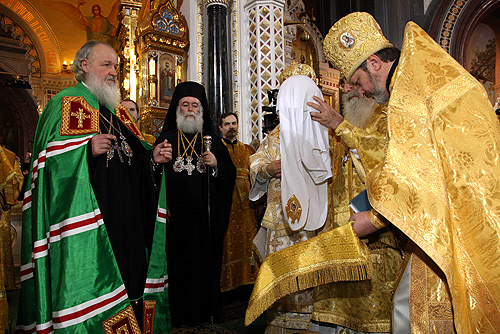
On January 27, 2009, the Local Council of the Russian Orthodox Church (the 2009 Pomestny Sobor) elected Kirill as the Patriarch of Moscow and All Rus'. He secured a decisive victory, receiving 508 out of 700 votes cast. His enthronement ceremony took place on February 1, 2009, at the Cathedral of Christ the Saviour in Moscow. The solemn service was attended by numerous dignitaries, including the then-President of Russia, Dmitry Medvedev, and the then-Prime Minister, Vladimir Putin, signaling the close ties between the Church and the state from the very beginning of his patriarchate. The following day, Medvedev hosted a reception for the ROC bishops at the Grand Kremlin Palace, where Patriarch Kirill articulated his vision for church-state relations, referencing the Byzantine concept of "symphonia" as an ideal, while acknowledging the practical challenges of fully achieving it in contemporary Russia.
4.2. Administrative Reforms
Patriarch Kirill has implemented substantial changes to the administrative structure of the Russian Orthodox Church during his leadership. On March 31, 2009, during its first meeting under his chairmanship, the Holy Synod reformed the Department for External Church Relations (DECR). This reform led to the creation of new synodal institutions, each tasked with specific areas of activity previously handled by the DECR.
Key reforms include:
- The establishment of the Synodal Department for Church-Society Relations, which operates independently from the DECR. This department is responsible for managing relations with legislative bodies, political parties, professional and creative unions, and other civil society institutions within the canonical territory of the Moscow Patriarchate.
- The direct subordination of dioceses, representative offices (ПодворьеPodvoriyeRussian), metochions, monasteries, and stavropegic parishes located abroad to the Patriarch of Moscow and All Russia. To manage these, the Moscow Patriarchate's Secretariat for Institutions Abroad (since 2010, the Moscow Patriarchate's Administration for Institutions Abroad) was created.
- The formation of the Synodal Information Department, aimed at enhancing the Church's communication strategies.
- The transformation of the post-graduate department of the Moscow Theological Academy, previously under the DECR, into the All-Church postgraduate and doctoral school named after Saints Cyril and Methodius Equal-to-the-Apostles.
Further structural reorganizations occurred on July 27, 2011, when the Holy Synod established the Central Asian Metropolitan District, restructuring the Church's presence in Tajikistan, Uzbekistan, Kyrgyzstan, and Turkmenistan. Beginning October 6, 2011, at the Patriarch's request, a comprehensive diocesan reform was initiated. This reform involved creating two to three dioceses within the territory of a single region, where previously there was only one. These new dioceses are unified under a "metropolis" (митрополияmitropoliyaRussian), an administrative structure designed to bring together neighboring eparchies, thereby decentralizing and streamlining church governance.
4.3. Ecumenism and Inter-Orthodox Relations
Kirill's stance and efforts regarding ecumenism-the movement promoting unity among Christian churches-have been complex and at times controversial. Early in his career, he was actively involved in the ecumenical movement as a representative of the Russian Orthodox Church to the World Council of Churches (WCC). However, upon becoming Patriarch, his approach to relations with other Christian denominations, particularly the Roman Catholic Church, faced scrutiny from conservative factions within the Russian Orthodox Church, who criticized his involvement in ecumenical dialogue throughout the 1990s. In 2008, the breakaway Bishop Diomid of Anadyr and Chukotka specifically criticized Kirill for his association with the Catholic Church. In response, Kirill issued a statement in 2009 clarifying that there could be no doctrinal compromise with the Catholic Church and that discussions with them were not aimed at seeking unification.
Despite these internal tensions, Kirill participated in a historic meeting on February 12, 2016, with Pope Francis, the head of the Roman Catholic Church. This was the first-ever meeting between a Pope and a Russian Orthodox Patriarch. The meeting took place at José Martí International Airport near Havana, Cuba, and concluded with the signing of a thirty-point joint declaration. The declaration addressed global issues such as their shared hope for the re-establishment of full unity between the two churches, the persecution of Christians in the Middle East, the Syrian Civil War, and church organization in Ukraine.
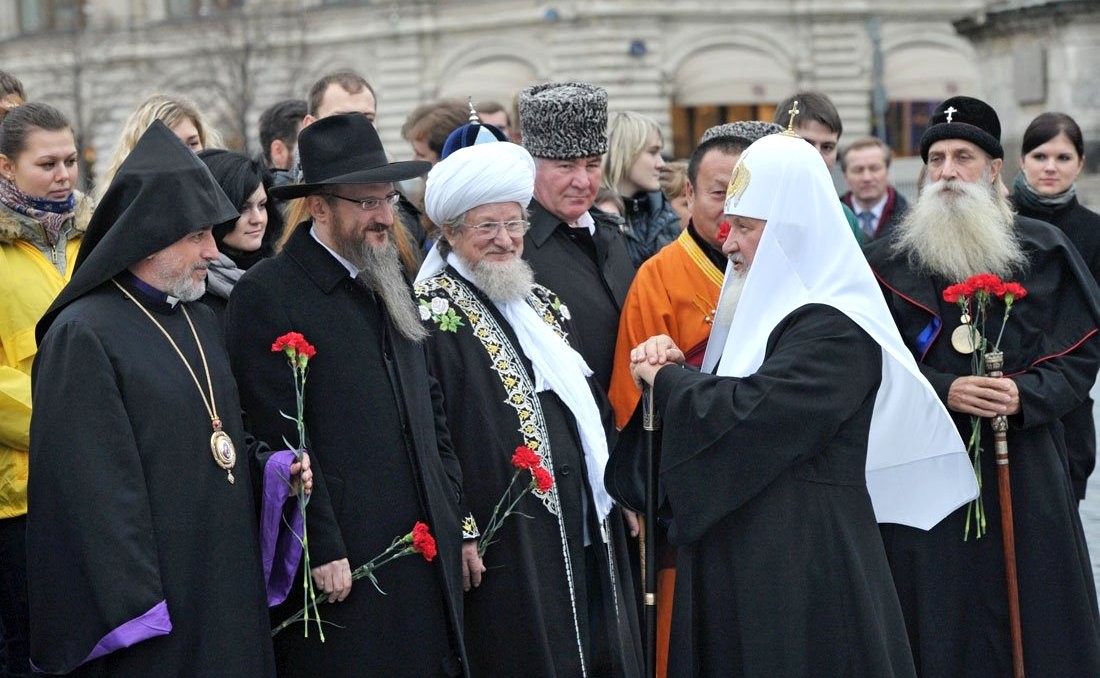
Kirill has also engaged in efforts to strengthen relations with other Orthodox churches. On September 3, 2019, he met with Paulose II, the head of the Malankara Orthodox Syrian Church, at the Patriarchal and Synod residence in Danilov Monastery, Moscow. During this meeting, Kirill supported proposals by Paulose II for cooperation in various academic and spiritual areas, including iconography, church choristers, monasticism, pilgrimages, summer institutes, and academic conferences, leading to the formation of a working committee.
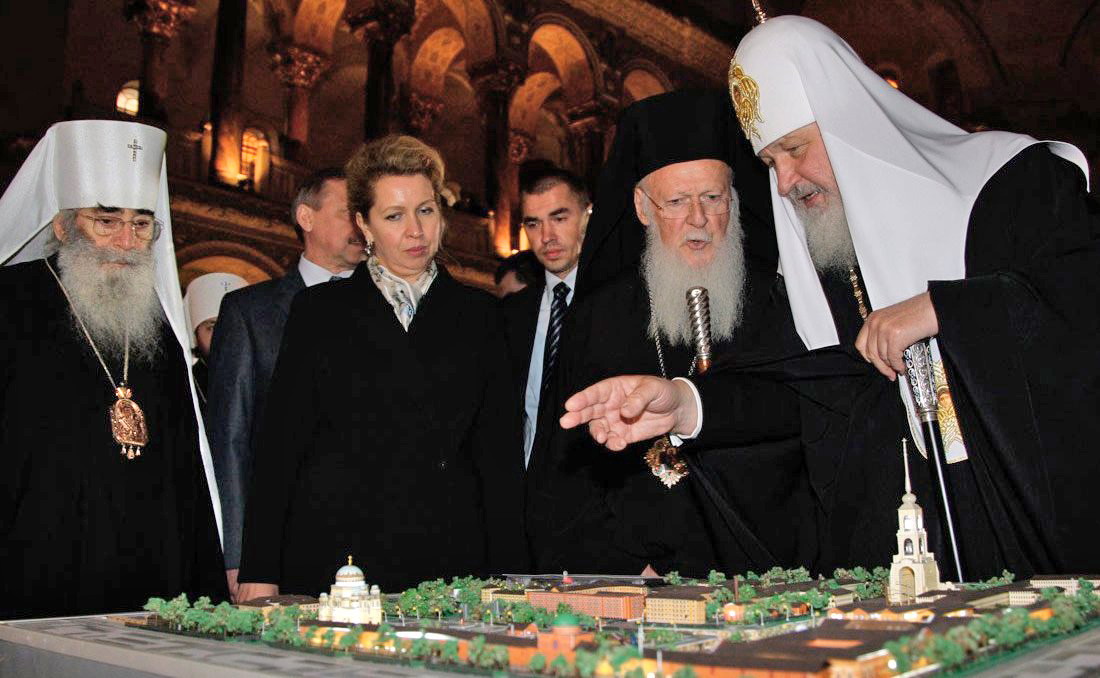
However, Kirill's relationship with Bartholomew I of Constantinople, the Ecumenical Patriarch and spiritual leader of Eastern Orthodox Christians worldwide, has been notably tense. This tension escalated significantly during the autocephaly controversy surrounding the Orthodox Church of Ukraine. On October 15, 2018, while presiding as chairman of the Holy Synod of the Russian Orthodox Church, Kirill approved the decision to break Eucharistic communion with the Ecumenical Patriarchate of Constantinople in response to its recognition of the Orthodox Church of Ukraine's independence. This move created a schism within the wider Orthodox world and further strained relations between the Moscow Patriarchate and other autocephalous churches that recognized the new Ukrainian church.
4.4. Relations with the Russian State
Patriarch Kirill's relationship with the Russian state, particularly with President Vladimir Putin, is characterized by a close alliance and ideological alignment, significantly shaping the Church's role in contemporary Russia. This partnership is often articulated through the Byzantine concept of "symphonia"-an ideal of harmonious cooperation between ecclesiastical and secular authorities.
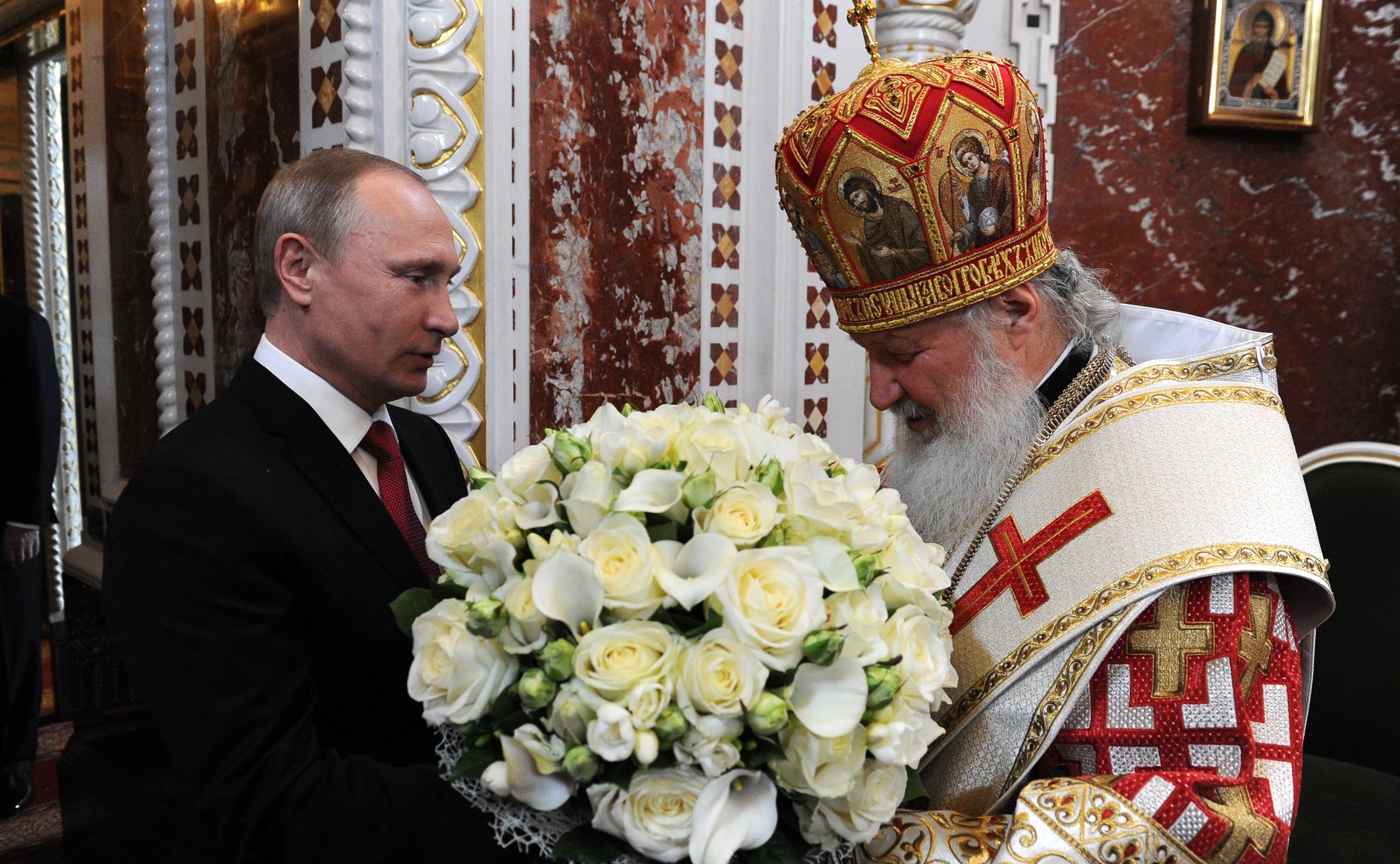
Kirill is a long-time ally of President Putin. During his enthronement ceremony on February 1, 2009, both President Dmitry Medvedev and then-Prime Minister Vladimir Putin were in attendance, underscoring the strong state presence at the highest Church events. The following day, at a reception hosted by Medvedev for ROC bishops, Kirill spoke of "symphonia" as his vision for ideal church-state relations, acknowledging that its full realization was challenging in modern Russia.
Kirill has consistently lauded Putin's leadership. On February 8, 2012, at a meeting of religious leaders in Moscow, he contrasted the economic and social chaos of the 1990s with the stability of the 2000s, stating, "What were the 2000s then? Through a miracle of God, with the active participation of the country's leadership, we managed to exit this horrible, systemic crisis." He also criticized anti-government protesters, likening their "demands" to "ear-piercing shrieks" and asserting they represented a minority of Russians. This statement solidified his public endorsement of the Putin era.
Under Kirill's patriarchate, the Russian Orthodox Church has increasingly collaborated with the Russian state in cultural and social affairs. This alliance has seen the Church frequently issuing public statements in support of Kremlin policies. For instance, a church spokesman described Russia's military campaign in Syria as part of a "holy battle" against international terrorism. Kirill himself has backed the expansion of Russian power into Crimea and eastern Ukraine. Early in the Ukrainian crisis, Kirill and the Russian Foreign Ministry issued almost identical statements, warning against confrontation and speaking of "brotherly" Ukraine. When Russia annexed Crimea, one of the justifications used was an alleged threat to parishes linked to Kirill's Moscow Patriarchate. His full title, "Patriarch of Moscow and All Rus'," itself references a medieval state in Kyiv to which modern Russia traces its roots, highlighting the Church's support for a broader Russian sphere of influence that includes Ukraine and Belarus.
Despite calling for the "speedy restoration of peace" at times, Patriarch Kirill has also referred to Moscow's opponents in Ukraine as "evil forces," stating, "we must not allow dark and hostile external forces to laugh at us." He has been described as a "committed nationalist of the imperial variety," someone who readily employs religious language to serve political ends, reinforcing the view that the Church under his leadership is deeply intertwined with and supportive of the Kremlin's geopolitical ambitions.
5. Controversies and Criticisms
Patriarch Kirill's tenure has been marked by significant controversies and criticisms, particularly concerning allegations of past ties to Soviet intelligence, financial impropriety, his political endorsements, and his conservative stances on social and international issues, which are seen as detrimental to human rights, democratic values, and social justice.
5.1. Allegations of KGB Affiliation
Beginning in the early 1990s, and intensifying throughout his career, Kirill has faced persistent accusations of having collaborated with the KGB during the Soviet era. Various reports, including those from The Times and Forbes, claim that he was a KGB agent operating under the codename "Mikhailov." According to materials from Soviet archives, including those reportedly brought to the UK by former KGB archivist Vasiliy Mitrokhin, Kirill's alleged involvement went beyond being a mere informer; he was considered an active officer of the organization.
The allegations suggest that "Mikhailov," at just 25 years old in 1971, was appointed as a representative of the Moscow Patriarchate to the World Council of Churches in Geneva, a position that allegedly served as a cover for intelligence activities. According to one analysis, a task assigned by the KGB was to involve the WCC in promoting the "theology of liberation"-a hybrid of Catholicism and Marxism-across Latin America. Neither Kirill nor his predecessor, Alexy II (who also faced similar allegations), have ever explicitly acknowledged or apologized for any ties to Soviet security agencies. Ukrainian citizens and media have expressed wariness, viewing Kirill as a "KGB guy" who supports "aggression against Ukraine," further fueling distrust of Russian-linked churches.
5.2. Financial Controversies
Kirill has been embroiled in several financial controversies that have drawn public scrutiny and criticism, primarily concerning allegations of profiteering, luxury possessions, and transparency.
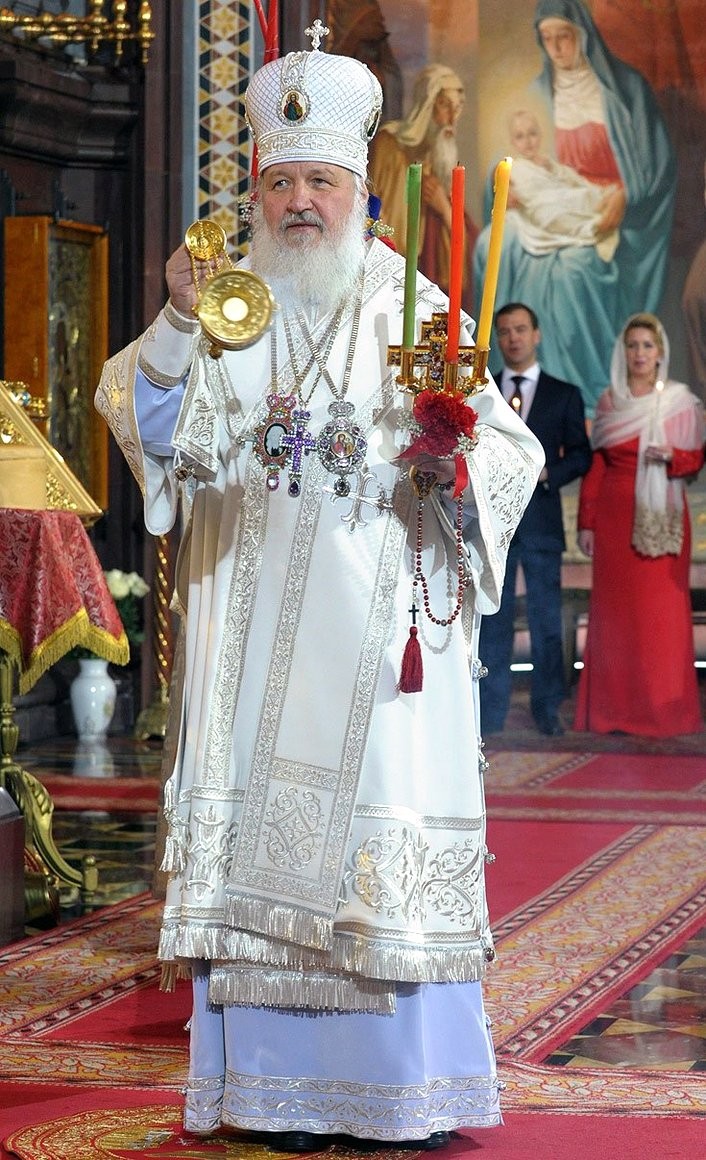
One of the most prominent allegations involved his supposed profiteering from the duty-free importation of cigarettes in the mid-1990s, a privilege granted to the Church. Journalists from Kommersant and Moskovskij Komsomolets dubbed him "Tobacco Metropolitan," accusing the Department for External Church Relations, which he led, of becoming a major supplier of foreign cigarettes in Russia. Sociologist Nikolai Mitrokhin estimated the profits from this operation, allegedly under Kirill's direction, at 1.50 B USD by 2004, while The Moscow News cited figures up to 4.00 B USD in 2006. However, some, like Nathaniel Davis, suggested that the profits were likely used for "urgent, pressing Church expenses" rather than personal embezzlement. The duty-free cigarette import operations ceased in 1997. In a 2002 interview, Kirill dismissed these allegations as a political campaign against him, and Alexander Pochinok, a former Russian tax minister, stated in 2009 that Kirill had no involvement in the violations.
Another widely reported controversy involved a luxury Breguet watch. In 2012, Kirill was photographed wearing a Breguet watch reportedly worth over 30.00 K USD. Initially, he claimed he had never worn it and suspected the photo was a "collage" or photoshopped. However, he later admitted to owning the watch, which he had received as a gift. Subsequent investigations by internet bloggers and media revealed other photos where he appeared to wear an expensive watch. One particular incident involved an image on his official website where the watch was digitally airbrushed out, but its reflection was still visible on a highly polished table surface. Russian Church officials attributed the photo manipulation to a 24-year-old employee acting "out of stupid, unjustifiable and unauthorized initiative" and promised severe punishment for those responsible. A Church spokesperson stated it was "unethical" to discuss Kirill's private life and accused "foreign forces" of orchestrating the attacks due to the Church's support for Putin. The incident led to him being awarded the satirical "Silver Shoe Award" for "immaculate disappearance of a watch" in the "Miracles up to the elbows" category in 2012, an award that drew a pained reaction from Church representatives.
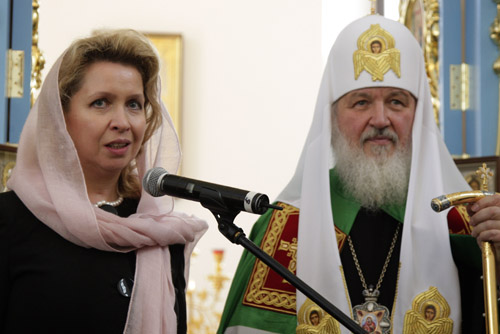
In March 2012, Kirill was also involved in a "dust compensation dispute." A court ruled that former Russian Health Minister Yury Shevchenko had to pay approximately 20.00 M RUB (about 676.00 K USD) in compensation. The lawsuit alleged that renovation work in Shevchenko's upstairs apartment, located in the prestigious House on the Embankment, generated dust that settled on a valuable book collection owned by Patriarch Kirill, who privately owned the apartment. Kirill confirmed his ownership of the apartment to journalist Vladimir Solovyov. Media reports were largely critical, mocking the claim that "dust" could cause such damages and suggesting a simple cleanup would have been more efficient. Kirill himself stated that he found it "inappropriate" to forgive Shevchenko.
A 2006 Forbes article estimated Kirill's wealth at 4.00 B USD. A 2019 Novaya Gazeta report further estimated his worth between 4.00 B USD and 8.00 B USD, though these figures remain unverified. A 2020 investigation by Proekt claimed that Kirill and two of his second cousins owned nine separate pieces of real estate in the Moscow Region and St. Petersburg valued at 2.87 M USD. He is also reported to have free access to over 20 residences owned by various religious organizations under the Russian Orthodox Church and is linked to businesses involving tobacco, automobiles, oil, and jewelry. The perception of his lavish lifestyle, despite his monastic vows, has frequently drawn public criticism.
5.3. Political Involvement and Endorsements
Patriarch Kirill's active political involvement and explicit endorsements of various figures and policies have generated considerable controversy, positioning the Church as a key supporter of the Russian state's agenda, often at the expense of human rights and democratic principles.
He "heartily congratulated" Belarusian dictator Alexander Lukashenko on winning the Belarusian presidency in 2010, despite the election being widely considered non-democratic. This endorsement aligned the Church with an authoritarian regime.
Kirill openly supported Vladimir Putin's presidential bids in 2012 and 2018, conducting special prayer ceremonies in honor of Putin's re-election each time. He has stated that Putin corrected Russia's "historically wrong path" after coming to power. His public backing effectively merged spiritual authority with political endorsement, reinforcing the narrative of a divine mandate for Putin's rule.
The Patriarch has also thrown the Church's weight behind Russian military interventions. In 2015, Kirill's envoy delivered a letter to Russian servicemen at Russia's Khmeimim Air Base in Syria, claiming that Russian troops were there to spread "love and peace." Kirill himself stated that Russia's actions in Syria were "just," aligning the Church with military actions that have been internationally criticized.
His statements on the historical origins and status of post-Soviet states have also been controversial. On May 28, 2022, Kirill asserted in a sermon that Vladimir Lenin had "tragically" dismembered "the historical Russia" into different countries, calling it a "terrible decision" with ongoing consequences. This narrative supports the Russian state's view of a unified historical Russia, implicitly undermining the sovereignty of former Soviet republics. In 2018, during a visit to Bulgaria to commemorate its liberation from the Ottoman Empire, Kirill criticized Bulgarian President Rumen Radev for thanking all ethnicities that fought for Bulgaria's independence as part of the Russian Imperial Army. Kirill insisted that Bulgarians should "only thank Russia" and that there was no place for "false interpretations of history," even adding a derogatory comment about Bulgarians being poor public speakers. In response, Bulgarian Vice Prime Minister Valeri Simeonov openly called Kirill a "2nd rate KGB agent" and "the Tobacco Metropolitan," statements later upheld by a local court as not defamatory.
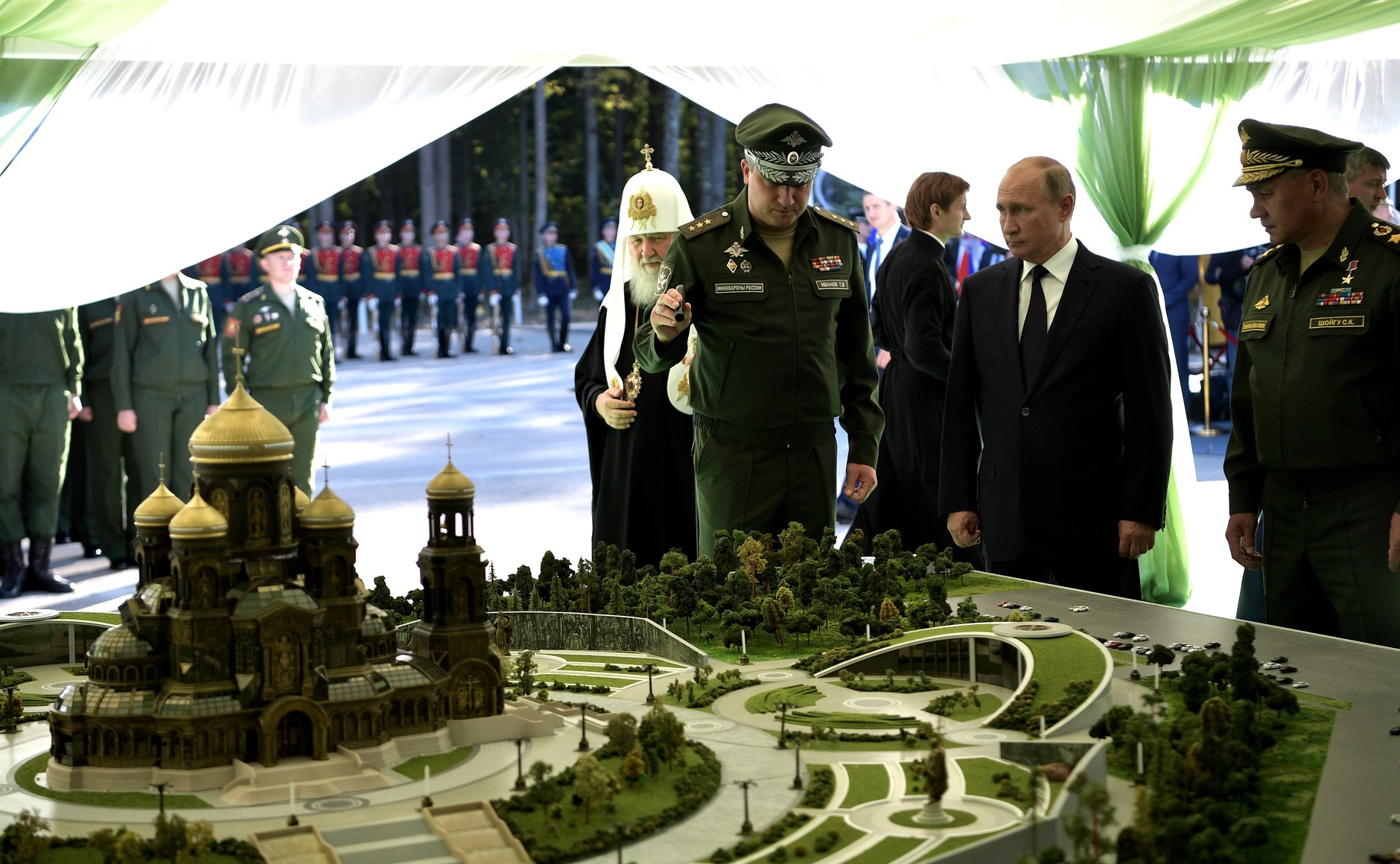
During the vote on amendments to Russia's constitution, Kirill urged Russians to support the changes. While he specifically highlighted an amendment adding a mention of faith in God, the vote was on the entire set of amendments, including one protecting Russia's territorial integrity and prohibiting negotiations on transferring Russian territories, further aligning the Church with the state's nationalistic agenda.
5.4. Stances on Social Issues
Patriarch Kirill's conservative views and policies on contemporary social matters have attracted significant criticism, particularly concerning human rights and social justice. He has consistently opposed same-sex marriage, stating in 2016 that silencing priests who speak against it is akin to censorship under Soviet totalitarianism. In May 2017, during a visit to Kyrgyzstan, he reiterated this stance, likening the suppression of such views to totalitarianism seen in Nazi Germany, and described same-sex marriage as a threat to "family values." These strong condemnations of LGBTQ+ rights align with the Russian state's anti-LGBTQ+ legislation and rhetoric.
Kirill has also been a vocal advocate for banning Jehovah's Witnesses in Russia since the 1990s. Under his leadership, the Russian Orthodox Church was a primary force behind the 2017 ban of the religious group, which affected approximately 170,000 adherents. On May 2, 2017, the Russian Orthodox Church issued a press release affirming its support for the ban, a position it reiterated in February 2019. This has led to accusations of human rights abuses from organizations like Human Rights Watch and the United Nations, with former U.S. Ambassador-at-large for International Religious Freedom, Sam Brownback, stating that Jehovah's Witnesses, as peaceful practitioners of faith, are entitled to practice their beliefs regardless of ideological agreement or disagreement.
5.5. Pussy Riot Incident
The Pussy Riot incident in March 2012 brought Kirill and the Russian Orthodox Church into a global spotlight of controversy, exposing deep societal divisions and sparking debates about freedom of expression and the Church's influence. Three female members of the feminist punk group Pussy Riot were arrested after performing a "punk prayer" song titled "Virgin Mary, Chase Putin Away!" inside the Cathedral of Christ the Saviour in Moscow. The song, which contained profanities, was performed in front of the altar, an act considered a desecration and offense by many Orthodox believers in Russia.
The women were arrested for hooliganism and subsequently sentenced to two years' imprisonment. Commenting on the case, Patriarch Kirill strongly condemned their actions, stating they were "doing the work of Satan" and should be punished. This stance provoked widespread criticism of the Orthodox Church, particularly on the Runet (Russian internet), for its perceived lack of mercy. Amnesty International declared the women "prisoners of conscience." In their closing statements, members of Pussy Riot accused Patriarch Kirill of using the Church to support the cultural position of Putin's government. Public opinion polls by the Levada Center showed that a majority of Russians considered the punishment excessive, though only a small percentage expressed sympathy for the group itself. Notably, then-Pope Pope Benedict XVI publicly supported the Russian Orthodox Church's position on the incident, viewing the performance as a desecration.
5.6. Statements and Positions on Ukraine
Patriarch Kirill's evolving positions on Ukraine have been a significant source of controversy, particularly his staunch support for Russian aggression and his characterization of the conflict as a "Holy War."
#### Positions regarding Ukraine and Ukrainians prior to the Russian invasion of Ukraine ####
Even before the full-scale invasion of Ukraine in 2022, Kirill's rhetoric had already laid a groundwork for Russian territorial claims and a narrative of external threats. On July 18, 2014, despite Russia's intervention in Donbas and the occupation of Crimea, Kirill asserted that "Russia poses no military threat to anyone." On the same day, President Vladimir Putin expressed his desire to involve Patriarch Kirill as a negotiator for the peace process in Ukraine, a move seen by critics as an attempt to leverage religious authority for political ends.
However, Kirill's true stance became clearer when, on August 14, 2014, in an address to the heads of other Orthodox churches, he described the anti-terrorist operation in Eastern Ukraine as a "war to eradicate Orthodoxy," waged by Catholics and Ukrainian Orthodox Autocephalists, whom he pejoratively labeled as "schismatics." This statement framed the conflict as a religious struggle, distorting the realities on the ground.
On December 25, 2017, through a decree, Patriarch Kirill awarded the head of the Russian administration of Crimea, Sergey Aksyonov, and the head of the Russian "State Council of Crimea," Volodymyr Kostiantynov, with the Order of St. Prince Daniel of Moscow of the 2nd rank and the Order of St. Seraphim of Sarov of the 2nd rank, respectively. Both individuals are wanted in Ukraine for actions aimed at seizing power, subverting the constitutional order, and treason, highlighting Kirill's direct support for figures involved in the illegal annexation of Ukrainian territory.
In May 2019, Kirill stated that those who set ablaze the Odesa Trade Unions House were "possessed of the Devil," but notably did not condemn the anti-Maidan activists who had killed two Maidan activists earlier on the same day in Odesa. During the vote on amendments to Russia's constitution, Kirill urged Russians to support amendments that included protecting Russia's territorial integrity, thereby prohibiting negotiations on the transfer of Russian territories to other countries, implicitly extending this to annexed Ukrainian territories.
On October 15, 2021, at the VII Congress of Russian Compatriots in Moscow, Kirill accused the West of trying to impose "false narratives" about World War II. He emphasized the need to "protect" Russians and compatriots worldwide and asserted that parishes of the Moscow Patriarchate unite Russians, Ukrainians, and Belarusians not only through religion but also through the Russian language. He strongly urged families of these peoples to teach their children to love their "historical homeland" Russia and to raise them as Russophones, promoting a pan-Russian identity that denies distinct Ukrainian nationhood.
#### Support for the Russian invasion of Ukraine ####
Following the Russian invasion of Ukraine on February 24, 2022, Patriarch Kirill has been a staunch supporter of the military aggression, actively justifying the war and characterizing it in religious terms, which has led to widespread international condemnation.
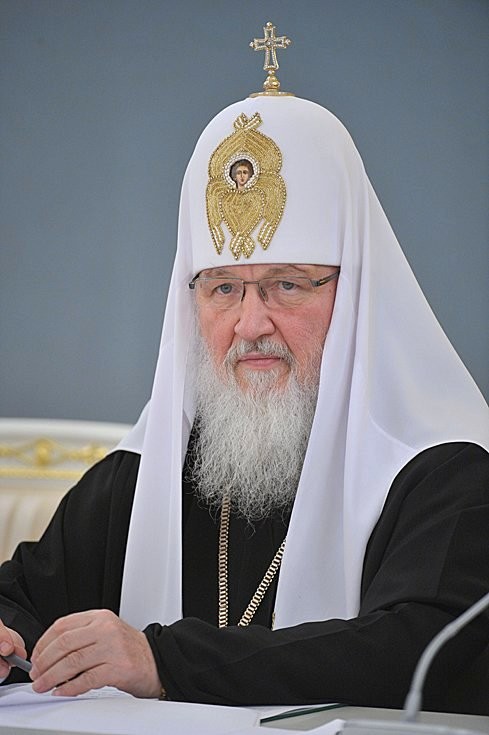
- Patriarch Kirill
Kirill has consistently avoided using terms like "war" or "invasion," instead referring to the conflict as "current events" or a "special military operation," aligning his language with Russian censorship laws. He has blessed Russian soldiers fighting in Ukraine, asserting that they have chosen a "very correct way." As a consequence, many priests within the Russian Orthodox Church in Ukraine have ceased mentioning Kirill's name during divine services, signaling a growing dissent.
He has controversially linked the conflict to "gay pride parades," alleging that they are part of the reason behind Russian warfare against Ukraine, and made unsubstantiated claims that Ukraine was "exterminating" Russians in Donbas. He has also asserted that the war is not merely physical but "metaphysically" important. On March 6, 2022, Forgiveness Sunday, Kirill used his sermon in the Church of Christ the Savior to justify Russia's attack, claiming it was necessary to defend "Donbas" from an 8-year "genocide" by Ukraine and to prevent the imposition of "gay pride events." He stated that forgiveness could not occur without first delivering "justice," otherwise it would be a "capitulation and weakness." This speech was widely scrutinized, especially his assertion that Russia was fighting "fascism" in Ukraine and his reference to both Russians and Ukrainians as "Holy Russians," implying a single people. He also invoked biblical verses, claiming Russian soldiers were "laying down their lives for a friend."
On March 9, 2022, Kirill declared that Russia has the right to use force against Ukraine to ensure its security, reiterating that Ukrainians and Russians are "one people" and that Russia and Ukraine are "one country." He further claimed that the West incites Ukrainians to kill Russians to sow discord and provides weapons for this purpose, thereby framing the West as an "enemy of Russia and God." In a letter to the World Council of Churches (WCC) in March 2022, he justified the attack by citing NATO enlargement, the protection of the Russian language, and the establishment of the Orthodox Church of Ukraine, notably without expressing condolences for Ukrainian deaths.
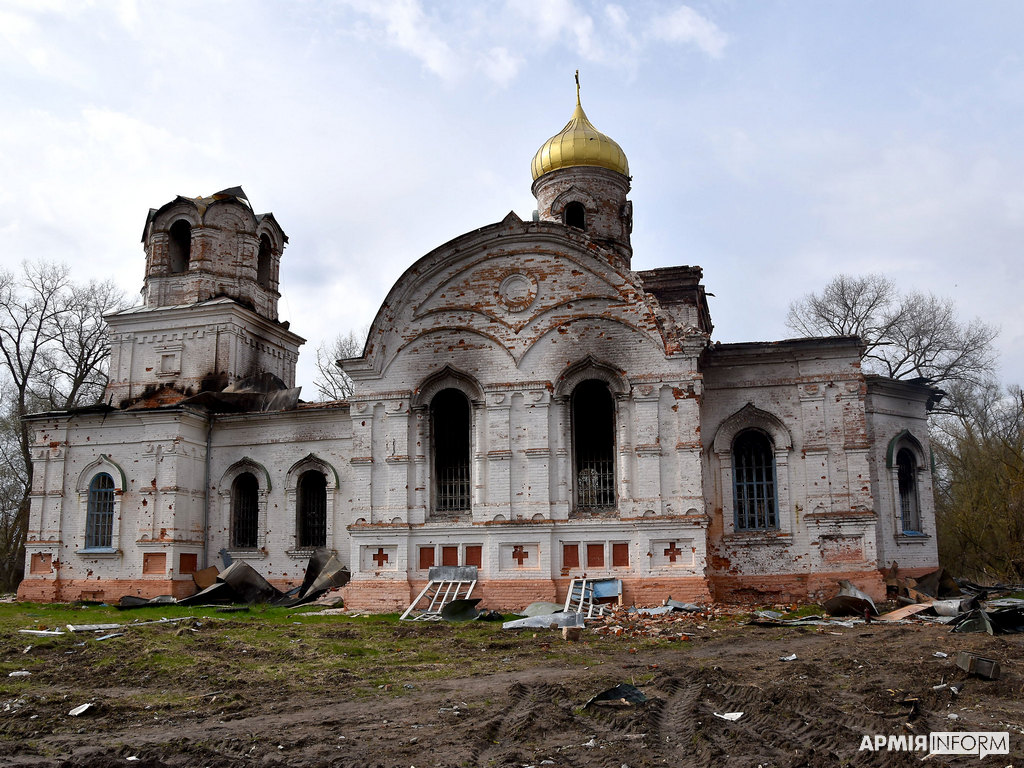
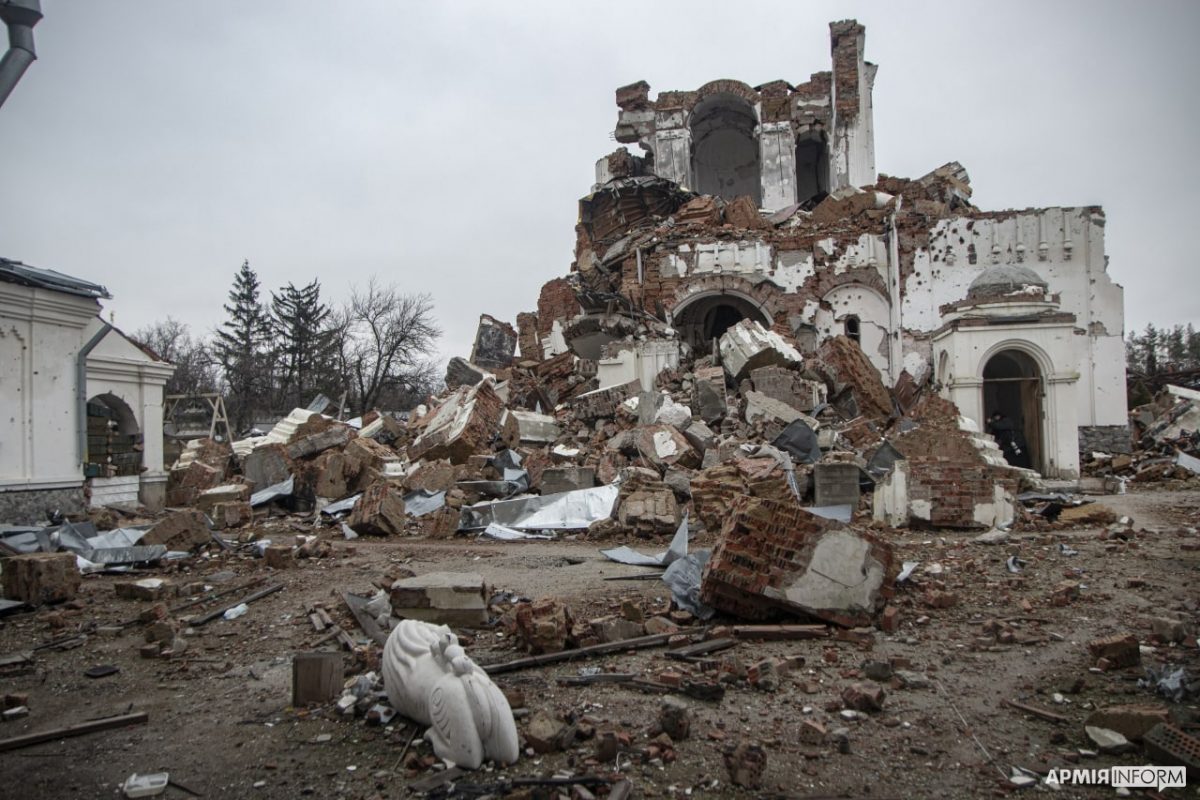
On March 16, 2022, Kirill participated in a Zoom video call with Pope Francis. Pope Francis later stated in an interview that Kirill "read from a piece of paper he was holding in his hand all the reasons that justify the Russian invasion." On March 27, 2022, Kirill expressed support for the actions of Rosgvardiya in Ukraine, praising its fighters and wishing them God's help. Following the Bucha massacre on April 3, he spoke at the Main Cathedral of the Russian Armed Forces, praising the armed forces for their "feats" of service and claiming Russia is "peaceful," despite mounting evidence of atrocities.
He has also supported the mobilization of citizens to fight in Ukraine, urging them to fulfill their military duty and promising that those who give their lives for their country "will be with God in his kingdom," implying a spiritual reward for combatants. On January 5, 2023, Kirill publicly called for a "Christmas truce" in Ukraine from January 6 to January 7, citing the Orthodox Christmas, a request that was implemented by Russia but largely disregarded on the battlefield.
On February 26, 2023, he proclaimed his support for annexing Donbas, asserting it belongs to Russia. Most recently, on March 27, 2024, the World Russian People's Council, led by Kirill, published a declaration characterizing the conflict as a "Holy War" where "Russia and its people, are defending the single spiritual space of Holy Russia." The document stated the goal was "protecting the world from the onslaught of globalism and the victory of the West, which has fallen into Satanism," and asserted that the entire territory of Ukraine should become "zone of Russia's exclusive influence." This declaration further intensified international criticism and calls for accountability.
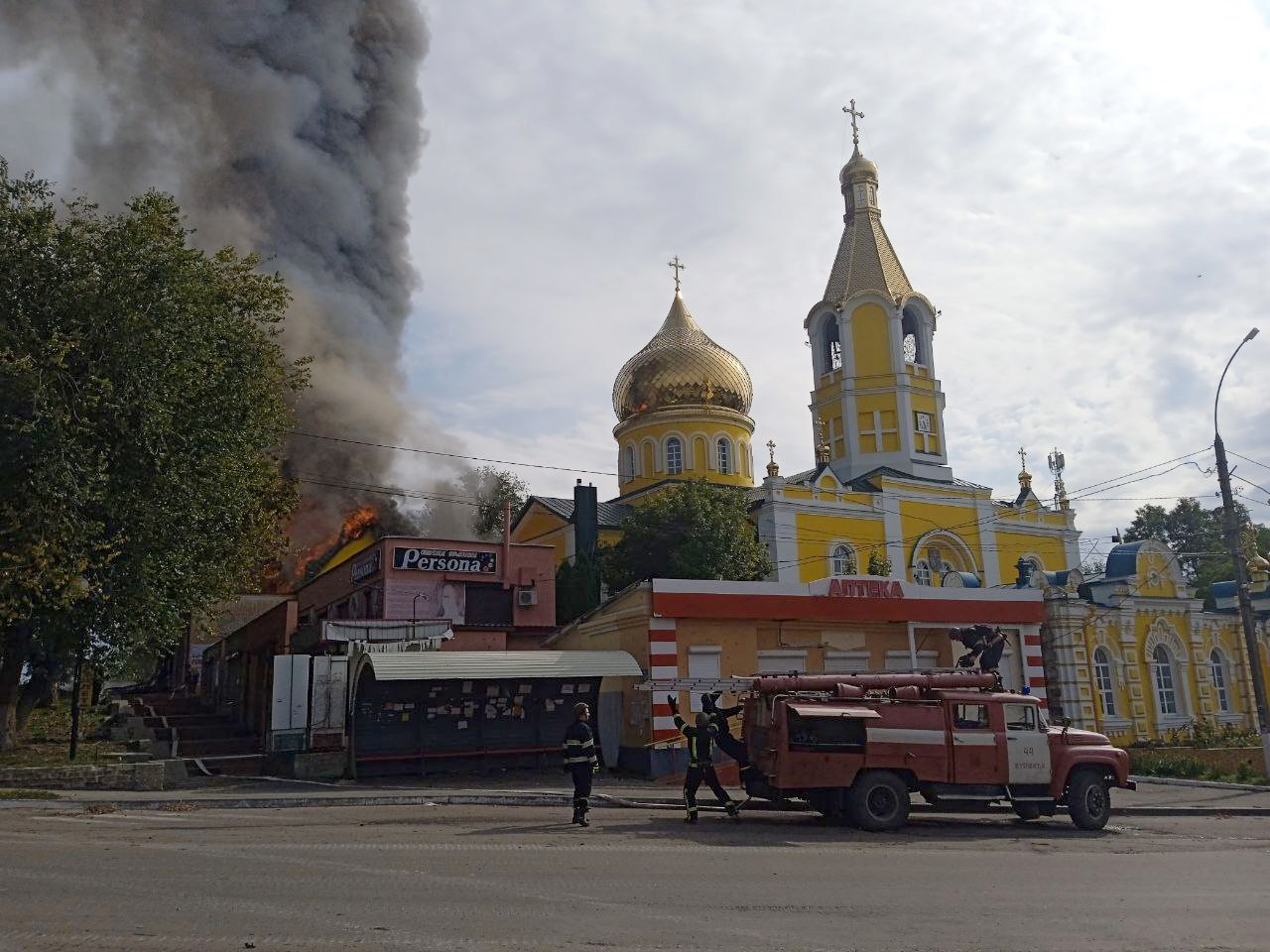
#### International Reactions and Sanctions ####
Kirill's outspoken support for the Russian invasion of Ukraine has triggered widespread condemnation from international religious leaders and organizations, leading to calls for his expulsion from ecumenical bodies and the imposition of sanctions.
Representatives from the Vatican have criticized Kirill for his unwillingness to pursue peace in Ukraine. On April 3, 2022, former Archbishop of Canterbury Rowan Williams publicly stated that there was a strong case for expelling the Russian Orthodox Church from the World Council of Churches (WCC), arguing that "When a Church is actively supporting a war of aggression, failing to condemn nakedly obvious breaches of any kind of ethical conduct in wartime, then other Churches do have the right to raise the question." Cardinal Kurt Koch, President of the Dicastery for Promoting Christian Unity, went further, calling Kirill's legitimization of the "brutal and absurd war" a "heresy."
In response to Kirill's stance, some Orthodox communities have sought independence from the Moscow Patriarchate. The Russian Orthodox St Nicholas church in Amsterdam, for instance, declared it could no longer function under Moscow's patriarchate and requested to join the Ecumenical Patriarchate of Constantinople. Similarly, the Russian Orthodox Church in Lithuania stated it did not share Kirill's political views and sought independence.
On April 10, 2022, nearly 200 priests from the Ukrainian Orthodox Church (Moscow Patriarchate) released an open letter appealing to the primates of other autocephalous Eastern Orthodox Churches. They requested the convening of a Pan-Orthodox Council of Primates to try Kirill for the "heresy of preaching the 'Doctrine of the Russian world'" and for the "moral crimes of blessing the war against Ukraine and fully supporting the aggressive nature of Russian troops." They also stated their inability to remain in canonical subordination to the Moscow Patriarch and called for Kirill to be deprived of the patriarchal throne.
Kirill has also faced direct sanctions. On April 9, 2015, during a meeting with Greek Prime Minister Alexis Tsipras, Kirill thanked Tsipras for his geopolitical support for Russia and condemned the sanctions imposed on Russia for its actions in Crimea and Donbas as "illegal and unfair." However, in 2022, Kirill himself became a target. He was sanctioned by Canada, the United Kingdom, and the Czech Republic. The UK's reasoning explicitly stated that "Patriarch Kirill has made multiple public statements in support of the Russian invasion of Ukraine. He therefore engages in, provides support for, or promotes any policy or action which destabilizes Ukraine or undermines or threatens the territorial integrity, sovereignty or independence of Ukraine."
In May 2022, the European Commission proposed including Kirill in a list of 58 entities for sanctions. However, he was later removed from this list due to intervention by the Hungarian government.
6. Personal Life
Patriarch Kirill's personal life, particularly concerning his wealth, has been a subject of public debate and controversy, distinct from the financial controversies related to church operations.
6.1. Wealth
Public scrutiny of Kirill's personal wealth began with a 2006 Forbes article estimating his net worth at 4.00 B USD. A 2019 report by Novaya Gazeta further estimated his worth to be between 4.00 B USD and 8.00 B USD, although these figures remain unverified. A 2020 investigation by Proekt claimed that Kirill and two of his second cousins collectively owned nine separate pieces of real estate in the Moscow Region and St. Petersburg, with a total value of 2.87 M USD. He is also reported to have free access to over 20 residences owned by various religious organizations under the Russian Orthodox Church, and has been linked to various business ventures, including those in tobacco, automobiles, oil, and jewelry. These reports of significant personal wealth and luxury possessions have often been met with criticism, given his spiritual role and monastic vows of humility.
7. Honours and Awards
Patriarch Kirill has received numerous honors, medals, and honorary citizenships throughout his distinguished career from various ecclesiastical bodies, the Russian Federation, and foreign countries.
7.1. Church Awards
Kirill has been extensively recognized by the Russian Orthodox Church and other local Orthodox churches globally for his service.
;Russian Orthodox Church
- Order of St. Prince Vladimir, 2nd class (September 16, 1973)
- Order of St. Sergius of Radonezh, 1st and 2nd class
- Order of the Holy Prince Daniel of Moscow, 1st class
- Order of St. Innocent Metropolitan of Moscow and Kolomna, 2nd class
- Order of St. Alexis the Metropolitan of Moscow and All Russia, 2nd class
- Named Panagia (1988) - for active participation in the preparation and conduct of the Jubilee celebrations of the 1000th anniversary of Christianity in Russia
- Order of Saint Anthony and Theodosius of the Caves, 1st class (UOC-MP, 2006)
- Order of Saint Stephen the Great pious governor, 2nd class (Orthodox Church of Moldova, 2006) - in recognition of diligent service and the glory of the Orthodox Church in Moldova
- Silver Jubilee Medal of St. Apostle Peter (St. Petersburg diocese, 2003)
- Order in honour of the 450th anniversary of bringing the land Pochayiv Volyn icons (UOC-MP, 2009)
- Order of St. Theodosius of Chernigov (Ukrainian Orthodox Church, 2011)
;Awards of local orthodox churches
- Order of Alexandria, Antioch, Jerusalem, Georgian, Serbian, Bulgarian, Hellenic, Poland, the Czech Lands and Slovakia, Finland and America.
- Order of the Holy Apostles Peter and Paul, I degree (Antiochian Orthodox Church, 2011)
- Gold Medal of St. Innocent (2009, The Orthodox Church in America)
;Awards of other churches and denominations
- The Order of St. Gregory of Parumala (Malankara Orthodox Syrian Church, India, 2006)
- Order of St. Gregory the Illuminator (Armenian Apostolic Church, Armenia, 2010)
- Order "Sheikh ul-Islam" (Caucasian Muslims Office, 2011)
7.2. Russian Federation Awards
He has received several state decorations and commendations from the Russian Federation.
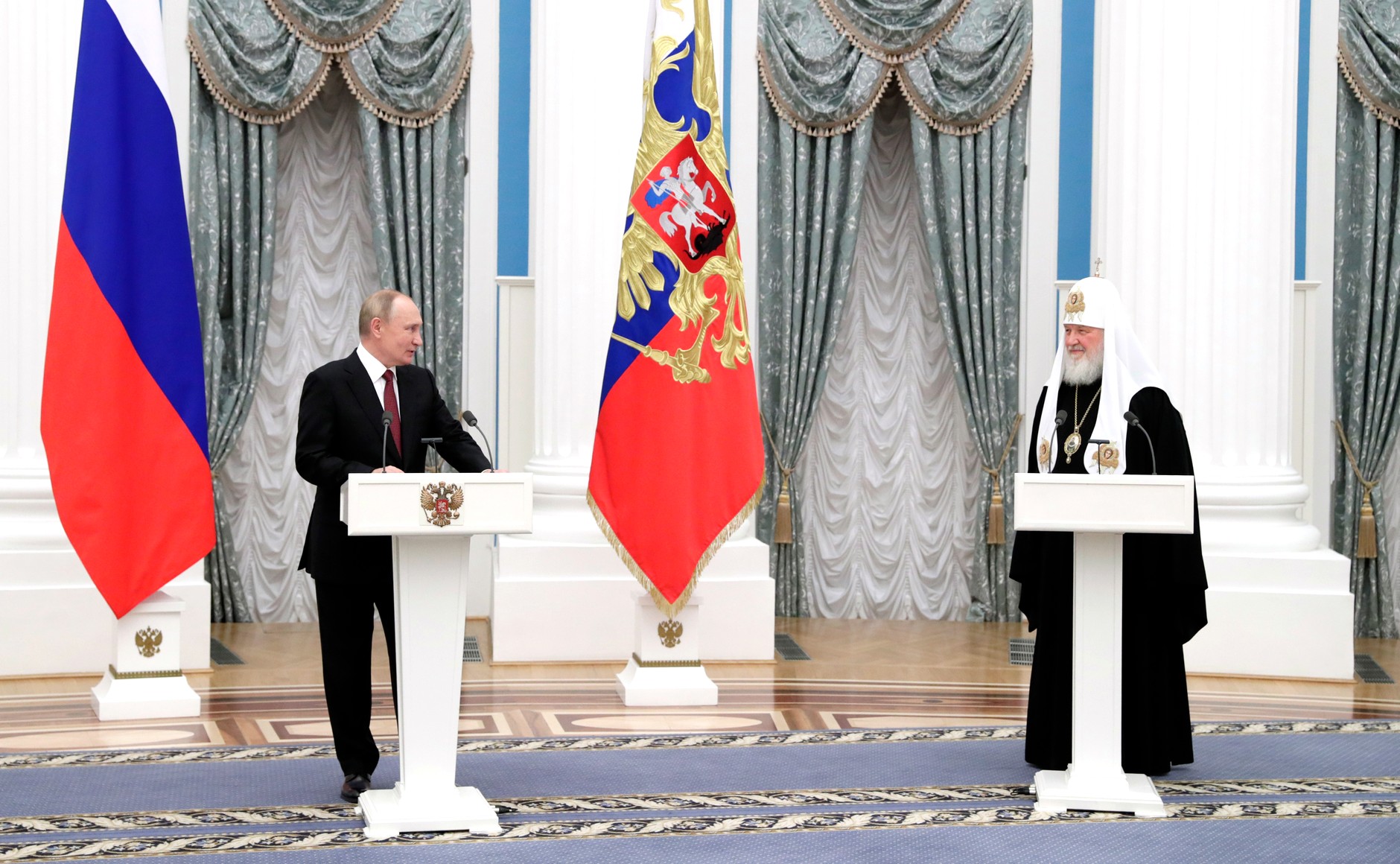
- Order of Merit for the Fatherland:
- 2nd class (November 20, 2006) - for his great personal contribution to spiritual and cultural traditions and strengthening friendship between peoples
- 3rd class (August 11, 2000) - for outstanding contribution to the strengthening of civil peace and the revival of spiritual and moral traditions
- Order of Alexander Nevsky (January 7, 2011) - for outstanding personal contribution to the Motherland in the preservation of spiritual and cultural traditions
- Order of Friendship (December 28, 1995) - for services to the state, the progress made in implementing a comprehensive program of construction, reconstruction and restoration of historic and cultural sites in Moscow
- Order of Friendship of Peoples (1988)
- Medal "50 Years of Victory in Great Patriotic War of 1941-1945."
- Jubilee Medal "300th Anniversary of Russian Navy" (1996)
- Medal "In memory of the 850th anniversary of Moscow" (1997)
- Gratitude of the President of the Russian Federation (August 14, 1995) - for active participation in the preparation and conduct of the 50th anniversary of Victory in Great Patriotic War of 1941-1945
- Diploma of the State Duma of the Russian Federation (2001)
7.3. Foreign Awards
Kirill has also been honored by countries outside of Russia.
- Order of Honour (Azerbaijan, 2010)
- Order of the Republic (Moldova, 2011)
- Medal "65th anniversary of Victory in Great Patriotic War" (Transnistria, 2010)
- Order of the Republic of Serbia (2021)
7.4. Honorary Citizenships
He has been granted honorary citizenship in various regions and municipalities.
- Lukoyanovsky District of Nizhny Novgorod Oblast (2000)
- Smolensk Oblast (February 5, 2009)
- Kaliningrad Oblast (March 5, 2009)
- Kemerovo Oblast (2010)
- Smolensk (2003)
- The selo of Rizskoye of Smolensk Oblast (2004)
- Neman of Kaliningrad Oblast (2006)
- Vyazemsky District of Smolensk Oblast (2006)
- Kaliningrad (2006)
- Khoroshyovo-Mnyovniki District of Moscow (2006)
- Republic of Mordovia (2011) - for outstanding contribution to the preservation and development of domestic spiritual and moral traditions, strengthening of interaction of church and state